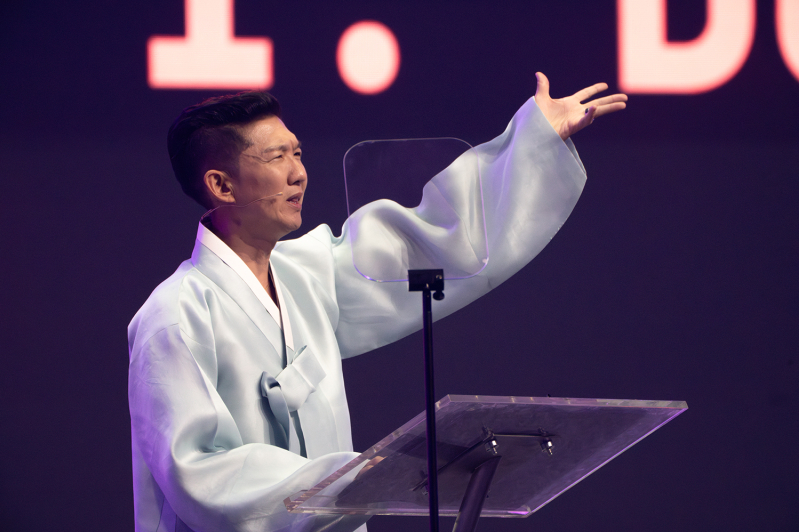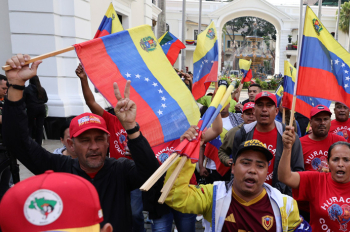
On September 22, the Fourth Lausanne Congress on World Evangelization (Lausanne 4) opened in Incheon, Korea bringing together some 5,000 participants from nearly every nation in the world, with as many expected to join the virtual experience online.
Presented as the largest and most diverse event in the history of evangelicalism, Lausanne 4 seeks to address the challenges and ‘gaps’ in the Church’s effort to fulfill the Great Commission: reaching the world for Jesus Christ. Held from September 22 to 28, it marks the 50th anniversary since the first global congress on world evangelization that was held in the city of Lausanne, Switzerland, in 1974.
And like Lausanne 1, the fourth Congress began by acknowledging the Church’s own failures in its witness to the world.
“50 years [after the first Lausanne Congress], we are humbled and we recognize that we still have a flawed witness in the world and a flawed mission to the world,” said Dr. Michael Oh, Global Executive Director of the Lausanne Movement, in his opening address.
While celebrating the progress over the past decades in reaching thousands of unreached people groups and the growth of the Church in Africa, Asia and Latin America, commonly describes as the Majority World or Global South, Oh highlighted that this growth comes in the context of explosive population growth overall. This means that rather than seeing an “acceleration of sharing the Gospel”, the trajectory shows a “deceleration”.
Echoing the call for repentance at Lausanne 1 led by the late Rev. Billy Graham, Oh lamented that “50 years later there continues to be a need for repentance for our failures.”
“The reputation of the bride of Christ in many places around the world is not good. Rather than people stumbling over the message of the Gospel as we see in Romans 9, too many are stumbling over the messengers. Too many scandals of pride, power, and impurity have robbed the Church and compromised our witness,” he said. The rise of social media also meant that these failures are “more public and profoundly felt and seen globally than ever before.”
Both the deceleration of growth and the tarnished reputation of the Church inspired the theme of the Congress to “let the Church declare and display Christ together”, he said.
Despite the failures, however, Oh struck a hopeful tone for the Congress, saying “we have every reason […] to be confident to gather together. Firstly because of the Gospel and secondly because of God’s strategy.” God’s plan to reach the world is accomplished through God’s people, Oh said and told participants, “That is why you are here.”
He went on to emphasize what he described as “the four most dangerous words” in the global Church today. They are not “I don’t like you,” as some might think. Instead, they are “I don’t need you,” Oh said.
He pointed to the passage in 1 Corinthians 12 where the Apostle Paul uses the image of the body of Christ cautioning believers that just as an eye cannot say to the hand “I don’t need you”, no believer can say to another that they don’t need them.
“We’re so self-focused, self-confident, self-sustained and perhaps flat out selfish, that we don’t see a need for a competitive advantage to working with others - other ministries, other businesses, other schools, other denominations or parts of the body,” Oh lamented.
“This has led to isolation in ministries, competition between ministries, fighting over financial resources, and ultimately ineffectiveness and ugliness of the body of Christ and one of the greatest reasons for the ineffectiveness of the body is the failure to incorporate the whole body into God’s mission.”
Oh then talked about the importance of the 99% of the Church that are not directly working in ministry as missionaries or pastors, but are called to be witnesses of the gospel in the “marketplace”. Whether professors, doctors, engineers or teachers, they are called to be faithful in following Jesus Christ and sharing the gospel with those around them.
He also called for greater collaboration, a theme that defined the format of the Congress as an interactive space where every participant onsite and online will be invited to contribute not only their thoughts but also whatever they have to bring to the table in terms of gifts and ministry.
Returning to the Congress’ theme, Oh called for greater unity as the paths that will lead to a stronger witness to the world.
“In our world today, it has perhaps become more difficult to declare Christ because we have not effectively displayed Christ. But if we are able to beautifully display Christ as the global Church our declaring of Christ will become more effective.”





